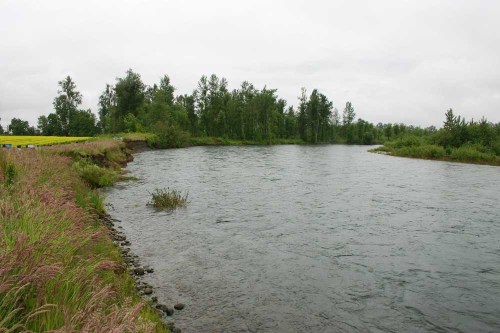Timber industry cautiously neutral on forest watershed acquisition bill
Published 1:15 pm Tuesday, February 7, 2023

- A river runs through forestland. Oregon lawmakers may create a grant fund to help communities buy the sources of their drinking water, which are often surrounded by private forestland.
SALEM — A bill that could restrict logging on some Oregon forestlands hasn’t raised objections from timber groups, so long as the actions to protect watersheds in it aren’t mandatory.
Under House Bill 2813, lawmakers would allocate $5 million for grants to help communities buy the sources of their drinking water, which are often within forests.
Aside from purchasing such properties, cities and other water suppliers could buy conservation easements that impose limits on the land to prevent water contamination.
Roughly half of the state’s drinking water sources are surrounded by private property, but the grant program would be strategic in protecting them, said Dylan Kruse, vice president of the Sustainable Northwest nonprofit.
“We’re not talking huge swaths of land. We’re talking about being smart about what the drinking water source area is,” he said during a recent legislative hearing.
By helping water suppliers to wholly or partly acquire watersheds, HB 2813 would guard against development while still allowing some forest management, Kruse said.
Communities could use the bill to retain “natural infrastructure” — since forests filter impurities from water — instead of investing in expensive treatment facilities, he said.
The grant program would also create matching state dollars that are needed to leverage federal funding programs for drinking water safety, Kruse said.
“We’re not talking about eminent domain. We’re not talking about new regulations,” he said.
As long as landowners aren’t forced into selling or limiting logging on their properties, two timber groups and a major timber company testified that they would not oppose HB 2813.
“Provided these are strictly transactions with a willing buyer and seller, we support communities and landowners partnering on various strategies related to forest health,” said Michael Eliason, government affairs director of the Oregon Forest Industries Council.
That sentiment was echoed by Weyerhaeuser, a major forestland owner, which already sells properties to communities for watershed management on occasion.
The company is currently neutral on the bill but Betsy Earls, its public affairs manager for Oregon and Montana, suggested that’s contingent on HB 2813 remaining non-compulsory.
“I’d like to caution you that it is very important to us that going forward, the bill maintains all ability for the sale to remain voluntary on the part of the seller and the buyer,” Earls said.
Water quality is already a high priority for Weyerhaeuser’s employees, who frequently live in same areas where they manager timber, she said.
Roger Beyer, lobbyist for the Oregon Small Woodlands Association, said his organization doesn’t oppose the bill but isn’t thrilled with some of its provisions.
For example, the Oregon Health Authority is responsible for water quantity, not just quality, under the bill, which seems like “mission creep” into the jurisdiction of the state’s Water Resources Department, he said.
Portions of the bill also appear to suggest that water quality is impaired in working forests, which is belied by state data that found water quality is better in forests than in any other land use, Beyer said.
“I think that language could be improved,” he said.
The voluntary nature of the transactions should be “spelled out in greater detail,” and the bill should not impose any new financial burdens on forestland owners, Beyer said.
Not only should HB 2813 not impose fees or taxes on forestland owners to raise money for grants, but they should also not be “expected to discount the value of the property in order to consummate the sale,” he said.









